条件式
条件式过去时
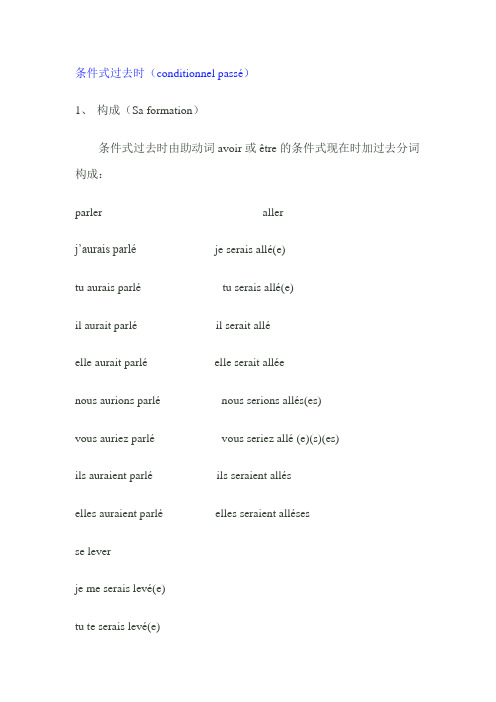
条件式过去时(conditionnel passé)1、构成(Sa formation)条件式过去时由助动词avoir或être的条件式现在时加过去分词构成:parler allerj’aurais parléje serais allé(e)tu aurais parlétu serais allé(e)il aurait parléil serait alléelle aurait parléelle serait alléenous aurions parlénous serions allés(es)vous auriez parlévous seriez allé (e)(s)(es)ils auraient parléils seraient alléselles auraient parléelles seraient allésesse leverje me serais levé(e)tu te serais levé(e)il se serait levéelle se serait levéenous nous serions levés(es)vous vous seriez levé(e)(s)(es)ils se seraient levéselles se seraient levées注意:使用动词être做助动词时,应特别注意主语与过去分词间的性,数配合。
2、用法(ses emplois):1)用于独立句:①推荐某件事已经发生,但未能肯定时用此语式,该用法常见于新闻报道。
On aurait envoyé un homme sur la lune.可能往月球上送人。
条件式

条件式The conditional is used to refer to hypothetical events. It occurs inpolite requests and most frequently with if clauses. In French, it iscalled le conditionnel and is most often translated by would in English.条件式用于表示假设的事件,在礼貌性要求或if从句中经常出现,可翻译成英语中的would形式。
1. formation(形式)The stem used to form the conditional is the same as the stem of thefuture (usually the infinitive). The conditional endings are -ais, -ais,-ait, -ions, -iez, -aient (These are also the imperfect endings).(将来时词根+未完成体词尾)jouer 'to play'je jouerais, I would play nous jouerions, we would playtu jouerais, you would play vous joueriez, you would playil, elle / on jouerait, ils / elles joueraient, they would playhe, she (it) /would playThe above formation works for -er verbs (aimer, j'aimerais), -ir verbs(finir, je finirais) and -re verbs (vendre, je vendrais). Remember todrop the final e from the infinitive stem of -re verbs .2. pronunciation(发音,词根末尾的r)The r in the stem is representative of the conditional, as well as thefuture. Only the difference in the pronunciation of the endingsdistinguishes the two. The difference between the je forms is subtle. Canyou hear the differences? Note also how the e of the infinitive of -erverbs changes in the future and conditional forms.regarder 'to look at'future(将来时)conditional(条件式)je regarderai je regarderaistu regarderas tu regarderaisil / elle regardera il / elle regarderaitnous regarderons nous regarderionsvous regarderez vous regarderiezils / elles regarderont ils / elles regarderaient3. irregular stems(不规则词根)Verbs with irregular future stems use the same irregular stems in the conditional. Here is a list of the most common irregular stems:infinitive stem conditional translationaller ir- j'irais I would goavoir aur- j'aurais I would runcourir courr- je courrais I would rundevoir devr- je devrais I would be obliged to envoyer enverr- j'enverrais I would sendêtre ser- je serais I would befaire fer- je ferais I would dofalloir faudr- il faudrait it would be necessarymourir mourr- je mourrais I would dieobtenir obtiendr- j'obtiendrais I would obtainpleuvoir pleuvr- il pleuvrait it would rainpouvoir pourr- je pourrais I would be ablerecevoir recevr- je recevrais I would receivesavoir saur- je saurais I would knowtenir tiendr- je tiendrais I would holdvenir viendr- je viendrais I would comevoir verr- je verrais I would seevouloir voudr- je voudrais I would want4. verbs with spelling changes(拼写变化的动词)Some verbs with spelling changes in the present form their future/conditional stem regularly. These include verbs like préférer, espérer, manger, and commencer.infinitive stem conditional translationpréférer préférer- j e préférerais I would preferespérer espérer- j'espérerais I would hopemanger manger- je mangerais I would eatcommencer commencer- je commencerais I would startVerbs with spelling changes like appeler, employer and acheter add -r to the present of the je form to create their future stem.present tense stem conditional translationj'appelle appeller- j'appellerais I would callj'emploie emploier- j'emploierais I would usej'achète achèter- j'achèterais I would buy5. uses(用法)1) wishes or requests(希望或要求)The conditional expresses potentiality. It is used to express a wish ora suggestion, to make a request, or to accept or extend invitations. Itis less direct and more polite than the imperative. The verbs 'pouvoir','vouloir', and 'devoir' are often found in the conditional to diminishthe strength of a command. In most cases, the conditional is translatedas meaning would in English. However, je pourrais means 'I could', je devrais means 'I should' and je voudrais means 'I would like'. Also donot confuse 'would' in English meaning 'used to' which should be translated as an imparfait in French, and NOT as the conditional: A Paris, Joe-Bob allait au MacDo tous les jours. (In Paris, Joe-Bob would/used togo to McDonald's everyday).Joe-Bob et Tammy se trouvent au restaurant où Edouard travaille comme serveur.Joe-Bob and Tammy are at the restaurant where Edouard works as a waiter.Edouard: Bonsoir Madame, Monsieur. Aimeriez-vous commander un apéritif pour commencer?Edouard: Good evening, would you like to order drinks to start?Tammy: Oh oui! Pourrions-nous avoir un Ricard et un Perrier? Ensuite, je voudrais une salade verte, s'il vous pla?t.Tammy: Oh yes, could we have one Ricard and one Perrier? Then I would like a green salad, please.Joe-Bob: Je veux un hamburger.Joe-Bob: I want a hamburger.Edouard: Monsieur, vous devriez être plus poli dans ce restaurant, sinon,je pourrais oublier votre commande!Edouard: Sir, you should be more polite in this resaurant, or else Icould forget your order!2) hypothetical action(前提动作)The conditional is used when making statements which are contrary to present facts. It expresses a hypothethical result which depends on (stated or implied) circumstances which do not exist. In order for theaction expressed by the conditional to occur, something else must take place first. Note that the condition in the si or if clause, is alwaysstated in the imparfait. (See 'si' clauses for further examples.)Tex et Joe-Bob regardent la télé. 'Le gros lot se monte à 30 millionsde dollars. Que feriez-vous si vous gagniez?'Tex and Joe-Bob are watching television. 'The Lottery is at 30 million dollars. What would you do if you won?'Tex: Moi, j'écrirais sans cesse des livres de philosophie.Tex: I would write philosophy books non-stop.Joe-Bob: Moi j'achèterais mon dipl?me d'université.Joe-Bob: I would buy my university diploma.3) possibility or uncertainty(可能性或不确定性)The conditional is also used to give information whose accuracy cannot be guaranteed. Journalists often use it to report events which are not knownto be true.Tammy et Bette regardent la télé. Soudain, leur programme préféré est interrompu et un commentateur annonce:Tammy and Bette are watching television. Suddenly, their favorite programis interrupted and a commentator announces:'Une tornade vient de s'abattre sur Hubbard, Texas. Il y aurait plusieurs victimes. Un tatou et un écureuil seraient gravement blessés. Restez avecnous, nous devrions avoir plus de détails d'ici quelques secondes . . .''A tornado just struck in Hubbard, Texas. Allegedly, there are several casualties. An armadillo and a squirrel seem to be seriously wounded.Stay with us, we should have more details in a few seconds . . .'Presque immédiatement, le téléphone sonne. Tammy répond: A . . ., All??'Almost immediately, the phone rings. Tammy answers: 'He . . ., Hello?'A l'autre bout, Tex dit: 'Tammy, c'est moi, Tex. Ne t'inquiète pas, onva très bien. Je rentrerai bient?t.'At the other end, Tex says: 'Tammy, it's me Tex. Don't worry we're fine.I'll be home soon.'4) reported speech (indirect discourse)(间接引语,过去将来时)In addition, the conditional is used to represent the future in relationto a narration in the past when reported speech is used to tell whatsomeone said.Tex a dit qu'il rentrerait bient?t.Tex said he would be home soon.练习Give the conditional of the verb indicated in parentheses.1. Edouard: Vous ______ aimable de fermer la porte. (être)2. Bette: Si ?a ne te fais rien, je ______ aller au concert. (préférer)3. Tammy: Tex, c'est l'anniversaire de Fiona. Tu ______ lui offir un cadeau. (devoir)4. Tammy: Il ______ vraiment que Tex travaille. (falloir)5. Tex: Edouard et moi, nous ______ bien envie d'une petite liqueur. (avoir)6. Bette: On ______ beaucoup rencontrer Tex. (aimer)7. Tammy et Bette ______ vivre en France. (aimer)8. Tex: Vous ______ intérêt à faire attention. (avoir)9. Joe-Bob: ______- vous me prêter de l'argent? (pouvoir)10. Tex: Je ______ un café, s'il vous pla?t. (vouloir)。
西语条件式
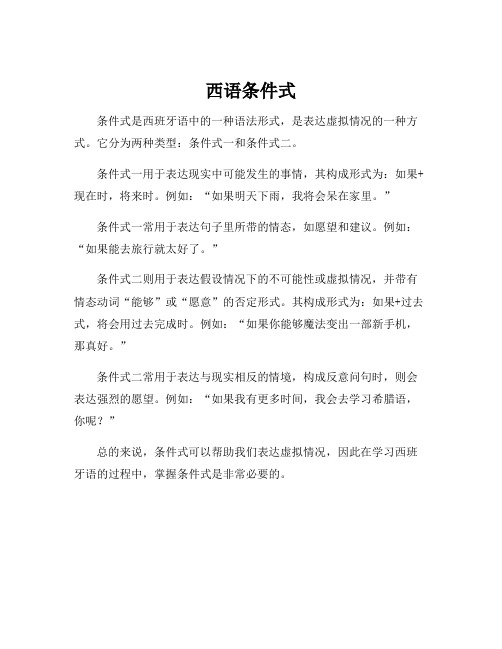
西语条件式
条件式是西班牙语中的一种语法形式,是表达虚拟情况的一种方式。
它分为两种类型:条件式一和条件式二。
条件式一用于表达现实中可能发生的事情,其构成形式为:如果+现在时,将来时。
例如:“如果明天下雨,我将会呆在家里。
”
条件式一常用于表达句子里所带的情态,如愿望和建议。
例如:“如果能去旅行就太好了。
”
条件式二则用于表达假设情况下的不可能性或虚拟情况,并带有情态动词“能够”或“愿意”的否定形式。
其构成形式为:如果+过去式,将会用过去完成时。
例如:“如果你能够魔法变出一部新手机,那真好。
”
条件式二常用于表达与现实相反的情境,构成反意问句时,则会表达强烈的愿望。
例如:“如果我有更多时间,我会去学习希腊语,你呢?”
总的来说,条件式可以帮助我们表达虚拟情况,因此在学习西班牙语的过程中,掌握条件式是非常必要的。
西语条件式用法
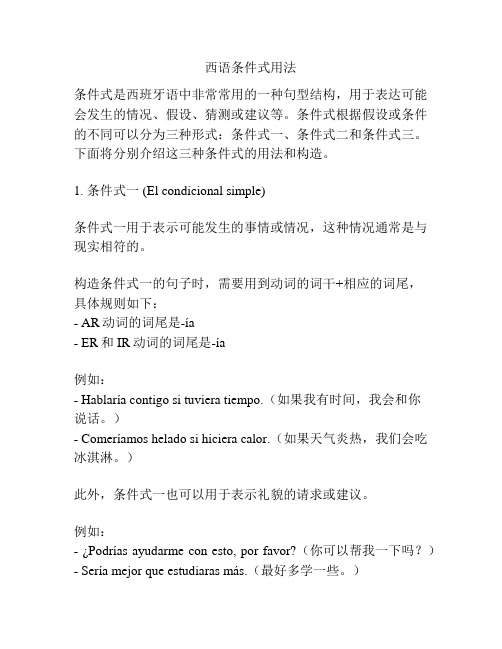
西语条件式用法条件式是西班牙语中非常常用的一种句型结构,用于表达可能会发生的情况、假设、猜测或建议等。
条件式根据假设或条件的不同可以分为三种形式:条件式一、条件式二和条件式三。
下面将分别介绍这三种条件式的用法和构造。
1. 条件式一 (El condicional simple)条件式一用于表示可能发生的事情或情况,这种情况通常是与现实相符的。
构造条件式一的句子时,需要用到动词的词干+相应的词尾,具体规则如下:- AR动词的词尾是-ía- ER和IR动词的词尾是-ía例如:- Hablaría contigo si tuviera tiempo.(如果我有时间,我会和你说话。
)- Comeríamos helado si hiciera calor.(如果天气炎热,我们会吃冰淇淋。
)此外,条件式一也可以用于表示礼貌的请求或建议。
例如:- ¿Podrías ayudarme con esto, por favor?(你可以帮我一下吗?)- Sería mejor que estudiaras más.(最好多学一些。
)2. 条件式二 (El condicional compuesto)条件式二用于表示与现实情况不符的假设、猜测或愿望。
构造条件式二的句子时,需要用到动词 haber 的条件式一形式加上动词的过去分词形式。
例如:- Si tuviera dinero, compraría una casa en la playa.(如果我有钱,我会在海滩上买房子。
)- Si pudiera volar, visitaría todos los países del mundo.(如果我能飞,我会去游览世界上的每个国家。
)条件式二也可以用于表示谦虚的请求或建议。
例如:- ¿Podrías ayudarme con esto, por favor?(你可以帮我一下吗?)- Sería mejor que estudiaras más.(最好多学一些。
西语条件式用法
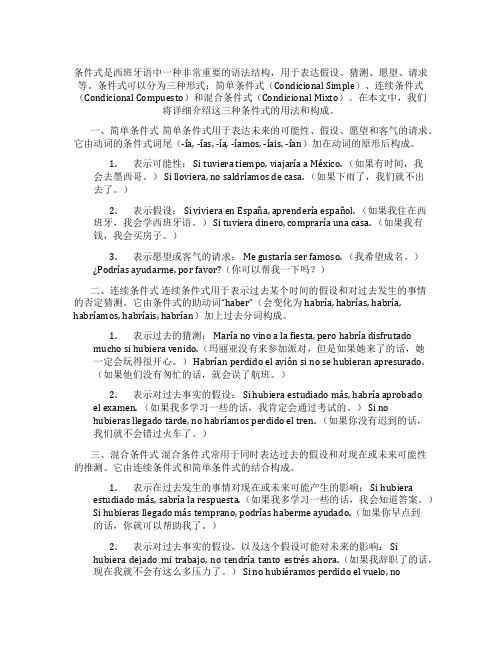
条件式是西班牙语中一种非常重要的语法结构,用于表达假设、猜测、愿望、请求等。
条件式可以分为三种形式:简单条件式(Condicional Simple)、连续条件式(Condicional Compuesto)和混合条件式(Condicional Mixto)。
在本文中,我们将详细介绍这三种条件式的用法和构成。
一、简单条件式简单条件式用于表达未来的可能性、假设、愿望和客气的请求。
它由动词的条件式词尾(-ía, -ías, -ía, -íamos, -íais, -ían)加在动词的原形后构成。
1.表示可能性: Si tuviera tiempo, viajaría a México. (如果有时间,我会去墨西哥。
) Si lloviera, no saldríamos de casa. (如果下雨了,我们就不出去了。
)2.表示假设: Si viviera en España, aprendería español. (如果我住在西班牙,我会学西班牙语。
) Si tuviera dinero, compraría una casa. (如果我有钱,我会买房子。
)3.表示愿望或客气的请求: Me gustaría ser famoso. (我希望成名。
)¿Podrías ayudarme, por favor?(你可以帮我一下吗?)二、连续条件式连续条件式用于表示过去某个时间的假设和对过去发生的事情的否定猜测。
它由条件式的助动词“haber”(会变化为habría, habrías, habría,habríamos, habríais, habrían)加上过去分词构成。
1.表示过去的猜测: María no vino a la fiesta, pero habría disfrutadomucho si hubiera venido.(玛丽亚没有来参加派对,但是如果她来了的话,她一定会玩得很开心。
条件式现在时变位规则

条件式现在时变位规则条件式现在时(Conditionnel Présent)是表示假设、推测、建议或客气请求的一种时态。
变位规则如下:对于所有动词,使用不规则动词"avoir"和"être"的条件式现在时变位:avoir:j'aurais, tu aurais, il/elle/on aurait, nous aurions, vous auriez, ils/elles auraientêtre:je serais, tu serais, il/elle/on serait, nous serions, vous seriez, ils/elles seraient对于一般的一类动词以及大多数二类动词,去掉动词词尾的"e", "es", "e", "ons", "ez", "ent",再加上以下词尾:-ais, -ais, -ait, -ions, -iez, -aient例如:parler (一类动词):je parlerais, tu parlerais, il/elle/on parlerait, nous parlerions, vous parleriez, ils/elles parleraientchoisir (二类动词):je choisirais, tu choisirais, il/elle/on choisirait, nous choisirions, vous choisiriez, ils/elles choisiraient对于有规则的三类动词,词尾与一类动词相同,但是词干发生改变。
-erais, -erais, -erait, -erions, -eriez, -eraient例如:vendre (三类动词):je vendrais, tu vendrais, il/elle/on vendrait, nous vendrions, vous vendriez, ils/elles vendraient需要注意的是,一些特殊的不规则动词在条件式现在时中会有变化,请根据具体动词进行相应的规则和变位检查。
法语条件式时态解析
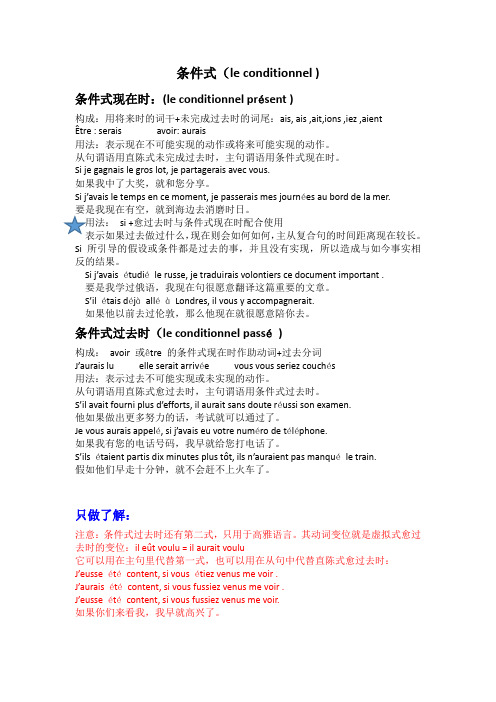
条件式(le conditionnel )条件式现在时:(le conditionnel présent )构成:用将来时的词干+未完成过去时的词尾:ais, ais ,ait,ions ,iez ,aientÊtre : serais avoir: aurais用法:表示现在不可能实现的动作或将来可能实现的动作。
从句谓语用直陈式未完成过去时,主句谓语用条件式现在时。
Si je gagnais le gros lot, je partagerais avec vous.如果我中了大奖,就和您分享。
Si j’avais le temps en ce moment, je passerais mes journées au bord de la mer.要是我现在有空,就到海边去消磨时日。
si +愈过去时与条件式现在时配合使用现在则会如何如何,主从复合句的时间距离现在较长。
Si 所引导的假设或条件都是过去的事,并且没有实现,所以造成与如今事实相反的结果。
Si j’avais étudiéle russe, je traduirais volontiers ce document important .要是我学过俄语,我现在句很愿意翻译这篇重要的文章。
S’il étais déjàalléàLondres, il vous y accompagnerait.如果他以前去过伦敦,那么他现在就很愿意陪你去。
条件式过去时(le conditionnel passé)构成:avoir 或être 的条件式现在时作助动词+过去分词J’aurais lu elle serait arrivée vous vous seriez couchés用法:表示过去不可能实现或未实现的动作。
条件式现在时
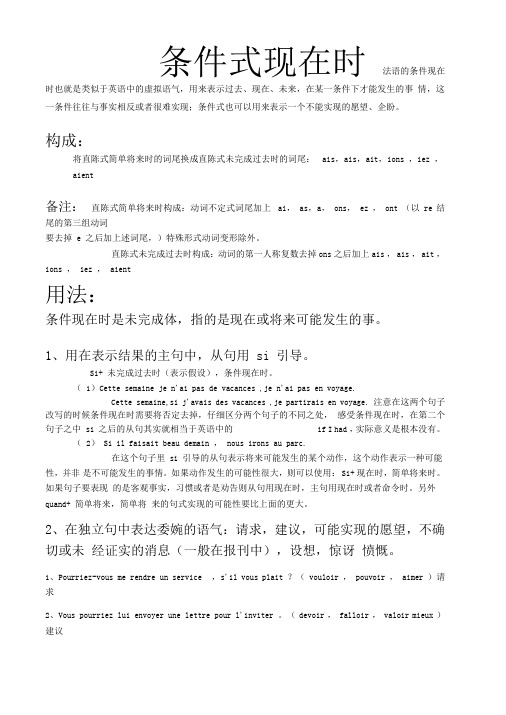
条件式现在时法语的条件现在时也就是类似于英语中的虚拟语气,用来表示过去、现在、未来,在某一条件下才能发生的事情,这一条件往往与事实相反或者很难实现;条件式也可以用来表示一个不能实现的愿望、企盼。
构成:将直陈式简单将来时的词尾换成直陈式未完成过去时的词尾:ais,ais,ait,ions ,iez ,aient备注:直陈式简单将来时构成:动词不定式词尾加上ai,as,a,ons,ez ,ont (以re 结尾的第三组动词要去掉 e 之后加上述词尾,)特殊形式动词变形除外。
直陈式未完成过去时构成:动词的第一人称复数去掉ons 之后加上ais ,ais ,ait ,ions ,iez ,aient用法:条件现在时是未完成体,指的是现在或将来可能发生的事。
1、用在表示结果的主句中,从句用 si 引导。
Si+ 未完成过去时(表示假设),条件现在时。
(1)Cette semaine je n'ai pas de vacances ,je n'ai pas en voyage.Cette semaine,si j'avais des vacances ,je partirais en voyage. 注意在这两个句子改写的时候条件现在时需要将否定去掉,仔细区分两个句子的不同之处,感受条件现在时,在第二个句子之中si 之后的从句其实就相当于英语中的if I had ,实际意义是根本没有。
(2)Si il faisait beau demain ,nous irons au parc.在这个句子里si 引导的从句表示将来可能发生的某个动作,这个动作表示一种可能性,并非是不可能发生的事情。
如果动作发生的可能性很大,则可以使用:Si+ 现在时,简单将来时。
如果句子要表现的是客观事实,习惯或者是劝告则从句用现在时,主句用现在时或者命令时。
另外quand+ 简单将来,简单将来的句式实现的可能性要比上面的更大。
- 1、下载文档前请自行甄别文档内容的完整性,平台不提供额外的编辑、内容补充、找答案等附加服务。
- 2、"仅部分预览"的文档,不可在线预览部分如存在完整性等问题,可反馈申请退款(可完整预览的文档不适用该条件!)。
- 3、如文档侵犯您的权益,请联系客服反馈,我们会尽快为您处理(人工客服工作时间:9:00-18:30)。
1. Venez dés 6 heures, à 7 heures ce (être) trop tard 2. Mes amis, écoutez-moi, je(vouloir) vous raconteur une belle histoire. 3. On (dire) que cet enfant a peur. 4. L’homme (être) plus heureux, s’il (se connatre) mieux 5. Si Napoléon ne (rester) pas si longtemps à Moscou, il ne ( perdre) tant d’hommes de sa grande armée. 6. Quand meme je (être) seul, je (lutter) 7. Il reste au lit sans bouger. On(croire) qu’il dort. 8. Aux dernières nouvelles, les blesses(être) hors de danger, ils (être ramenés) chez eux. 9. Les étudiants se demandaient s’ils(avoir) un nouveau professeur de franais. 10. Ne faites pas de bruit: l’enfant( s’éveiller) 11. Mon enfant, si tu (trouver) sur le trottoir un porte-monnaie, qu’en(faire) tu? 12. Mon père m’a dit qu’il ne(revenir) pas avant midi. 13. Qui(imaginer) un si bon résultat? 14. Si le camarade Zhou Enlai ne nous(quitter) pas en 1976, que de services( render) il encore au people? 15. En lisant cet ouvrage, vous (pouvoir) apprendre beaucoup de choses. 16. Nous croyions que Marie(être) guérie quelques jours plus tard. 17. Si le temps le ( permettre) demain, je vous ( accompagner) 18. S’il ( savoir) , il ( agir) autrement.
其他用法 1) 表示条件的从句部分,除了用连词si引导之外,还可以使用介词或介词短语来引 导条件状语,或使用副动词及其他语法形式来代替条件从句。例如: Avec plus d’efforts,tu ferais de plus grands progrès. 如果付出更多的努力,你就会取得更大的进步。 A votre place, je ne l’aurais pas fait. (如果)处在您的位置,我是不会做这事的 Sans votre aide, je n’aurais pas pu finir mes études universitaires. (要是)没有您的帮助, 我是无法完成大学学业的。 En parcourant les champs en été, tu admirerais des ondes de blé couleur d’or (如果你)在夏季穿越田野,你会欣赏到那金色的麦浪翻滚。 Un pas de plus, tu serais tombé dans le précipice. (如果)再走一步,你就会跌下深渊。
2. 条件式过去时用在以si引导的复合句中,表明过去的某个动作可以实现但实际 未能实现。从句时态用直陈式愈过去时。 Si j'avais bien révisé avant l'examen, j'aurais obtenu une bonne note. 如果我在 考试前认真复习,我现在可能会取得一个好成绩。(事实上我并没有认真复习) 考试 Si Pascal avait su que son ami était à Shanghai, il serait allé le voir. 如果帕斯卡 知道他的朋友在上海 上海,他可能会去看他的。(事实上帕斯卡根本不知道他的朋友 上海 在上海) 3. 条件式过去时用在从句中,表示在过去的时间里一个先完成的将来动作。 例:Le professeur lui a demandé s'il aurait fini ses devoirs avant la semaine prochaine. 老师问他下个礼拜之前能否完成作业。 Son copain lui a promis de l'épouser dès qu'elle serait retournée en Chine. 她 男朋友许诺等她一回到中国就娶她。
注意: (1) Si + il(s) = s’il(s) ; 不要说: si il(s) Si + elle(s) = si elle(s) ; 不要说 : s’elle(s) (2)表示假设的例句往往可分为两类, 一类是其假设有可能成为事实,而另一类是纯粹的假设,没有可能成为事实。 从上述这两种时态看, ① 往往表示很有可能成为事实的假设,si不仅有“如果”的意思,往往也含有“每当”的意思, ② 往往是不可能成为事实的假设。 试比较: S’il fait beau demain, nous pourrons aller faire une excursion dans les environs de Beijing. 如果明天天好,我们可以去北京郊区远足了。 (讲话者认为明天很可能天好,可以出去玩。) S’il faisait beau demain, nous pourrions aller faire une excursion dans les environs de Beijing. 要是明天天好的话,我们就可以去北京郊区远足了。 (讲话者心中无底,认为明天很可能天不好,出去玩的可能性不大。) S’il faisait beau maintenant, nous irions faire une excursion dans les environ de Beijing. 要是现在天好的话,我们就可以去北京郊区远足了。 (实际上现在天气不好,我们不可能出去玩,因此这句话是不可能成为现实的假设。)
3 dire 和 croire 的条件式单独使用, 通常主语使用on, 表示“看来,似乎, 好像”。例如: Qu’avez-vous? On dirait que vous êtes malade 您怎么啦?好像病了似的。 Ses yeux étaient rouges, on aurait dit qu’elle avait pleuré 她的眼圈红红的,像是哭过。 Tout est calme, on croirait qu’il n’est rien arrivé 一切都那么宁静,就像什么事也没有发生过。 4. 条件式现在时和条件式过去时也可以分别表示将来可能发生的事,即过去将来时 与过去先将来时,属于直陈式范围内的时态问题,常见于间接引语的时态配合中。 例如: Le professeur nous a dit qu’il faudrait lui remettre les devoirs le lendemain matin. 老师对我们说第二天早晨必须交作业。 Je croyais qu’il aurait fini son travail avant minuit. 我以为他子夜前已结束工作了。
条件式现在时(Le conditionnel présent) 1、构成: 、构成: 法语的条件式现在时的形式与直陈式过去将来时相同,即由简单将来时的词根 加下列词尾构成 -ais, -ais, -ait, -ions,-iez, -aient。没有例外。 2、用法: 、用法: 1)条件式用于独立句中, 条件式用于独立句中, 条件式用于独立句中 (1)表示婉转的请求,建议,愿望: )表示婉转的请求,建议,愿望: Je voudrais aller à Marseille demain. 明天我想去马赛。 Est-ce que vous pourriez me réserver une place dans le train ? 您能否为我预定一张火车票。 J’aimerais mieux rester à la maison. 我更愿意呆在家里。 Il vaudrait mieux aller voir le médecin. 最好去看医生。 (2)表示推测,可能性,设想或不肯定 (特别用于指出没有得到证实或核实 )表示推测,可能性, 的信息) 的信息) On pourrait revenir dans un quart d’heure. 可能一刻钟以后回来。 Dans cet accident, il y aurait 100 morts et 200 blessés. 在这次事故中,大概有100人死,200人伤。 Les employés auraient beaucoup à dire sur cette décision annoncée par leur patron. 工人们对老板宣布的这一决定可能有好多话要说。
条件式过去时(le conditionnel passé le passé) 构成 :avoir或être的条件式现在时形式+p.p. 1. 用在独立句中表示惋惜,遗憾,责怪,或假设,常用于表示过去可能发生但实际 并未实现或不十分肯定的 动作,并且常见于新闻报道。 Le président de la République serait arrivé en Chine pour la visite amicale. 共和国总 统可能已经到达中国 中国进行友好访问。 中国 Vous auriez pu éviter cet accident.(表惋惜) Hier, J’aurais voulu vous téléphoner pour prévenir de son marriage. (表遗憾) Toutes les maisons auraées par le typhoon. (表推测) Vous auriez d l’accompagner à Paris. (表责怪)
